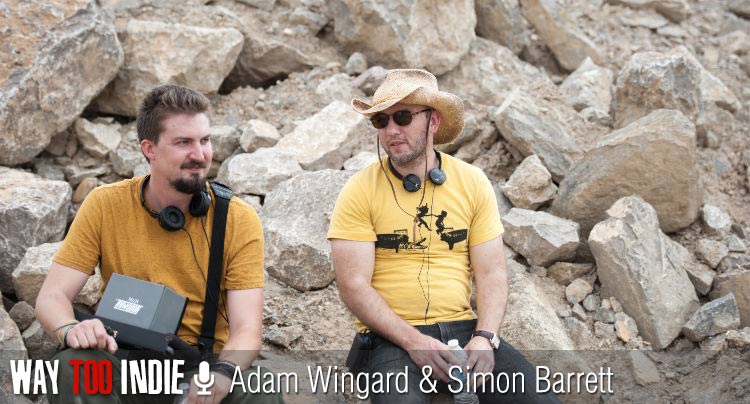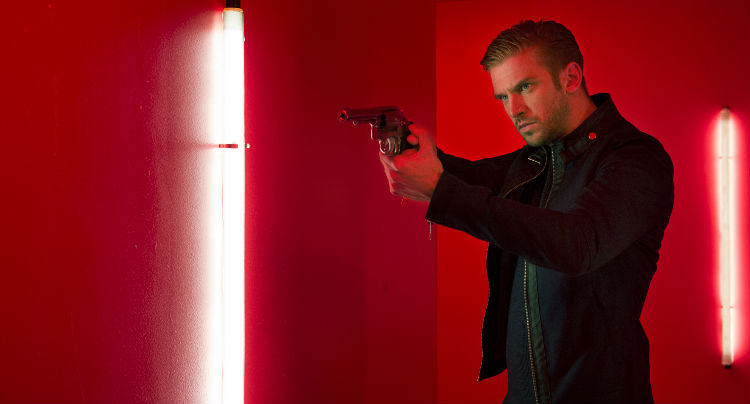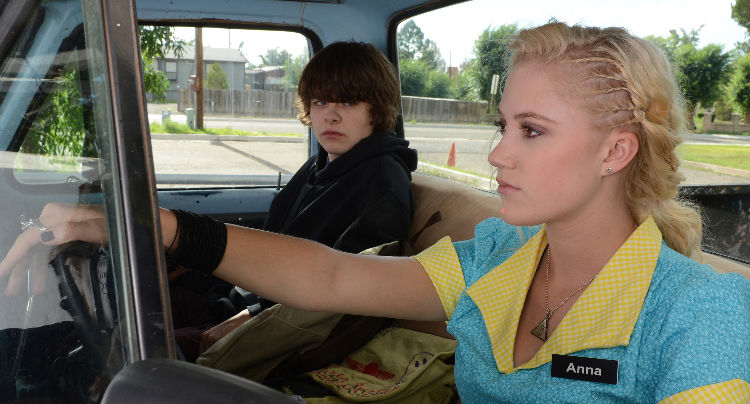Adam Wingard & Simon Barrett On the Challenges and Opportunities Modern Audiences Present

The team of director Adam Wingard and writer Simon Barrett made what was one of my favorite films of last year, the stylish, playful, home-invasion thrill ride You’re Next. 2014 is another year, and another home run for the duo as their new film, The Guest, starring Dan Stevens, toys with genre conventions even further, pulling inspiration from films like The Terminator and Halloween and fusing elements from those films with their modern perspective to make something that feels both entirely new and deliciously nostalgic.
Stevens plays a soldier who visits the home of the mourning family of his fallen comrade, befriending them to the point that he’s invited to stay. As random acts of violence begin to pop up around town, the family’s daughter (Maika Monroe) begins to suspect their handsome new guest may be the culprit.
As a big fan, it was a pleasure for me to talk with Adam and Simon about the film’s origins, the key to avoiding genre parody, the challenges and opportunities modern audiences present, Stevens’ attributes as an actor, whether press interviews help them understand their films better or not, and much more.

Simon, correct me if I’m wrong, but did the project start as a more serious, straightforward story?
Simon: It’s hard to say that the project started that way. It was an earlier attempt at the screenplay. I had met Adam and we were friends when I was working on it, but we hadn’t started working together yet. It was a script I’d started on my own, and it wasn’t too long after the invasion of Iraq in 2003, so it was a little more self-serious. I just kind of abandoned it because it didn’t feel right. It felt like I was commenting on a bunch of things that I didn’t have any real personal understanding of, which was kind of a bummer. But it did at its core have a cool idea of this mysterious soldier visiting this family and insinuating himself into their lives. I liked that idea, but I didn’t know how to tell that story. I stopped at about page 30 and kind of forgot about it completely. In late 2012 when we first started talking about this film and Adam was talking about the ’80s genre films that inspired us both to become filmmakers, I realized that that concept combined with that style worked surprisingly well. All of the things that were turning out too serious in that draft would be different if it they were less specific and more entertainment-oriented.
The Guest is a nostalgia film, and movies with similar aims either end up being imitations of the genres they reference or insert themselves as a legitimate entry into the genre. Talk about riding that line and what it takes to avoid being a copycat.
Adam: We were very aware that we didn’t want the film to fall into any kind of parody. I think the secret to achieving that starts with Simon’s screenplay and the emphasis on the characters. The movie’s plot is moved forward by the consistent actions the characters take once they’re established. I feel like another thing we do is take certain elements from things that are clearly cinematic ideas and concepts, some of which you’ve seen before. As a matter of fact, I think most of the things in The Guest, in one way or another, you’ve seen a version of them. But by collecting them and adding a unique perspective to it, I think that’s what creates this new, cohesive atmosphere. It always starts with the characters, but a lot of it has to do with picking what you show and don’t show. If this movie had chosen to show more of David’s background and had a more Hollywood approach to it, suddenly it would be one of those movies, more on-the-nose. We purposefully don’t give you all the information, and we also never let you know what David’s thinking at any point. It allows the audience to fill in those blanks. A lot of the time, giving audiences that space is what creates better movies. Hopefully people will think we’ve done that.
Simon: For me, I think the answer to your question was contained within your question. I’m not interested in pure homage or making pastiche pieces. It’s more about looking at what those films did and figuring out what the current version of that is. It’s looking at the effect they had on me when I first saw them and figuring out something that’s unique but would create that same feeling.
Adam: If you look at filmmakers in their early stages, when they’re in film school or high school, making movies in their backyard, a lot of the first things people do are just straight imitations, you know what I mean? I can’t even count how many people in our generation made Blair Witch knockoffs. That’s worth avoiding because, when you think about it, that’s always the starting point anyway. It’s not necessarily a mature outlook. But if you can find a way to take these tried-and-true methods and integrate it into a new perspective, suddenly you’ve got something.
In your style of filmmaking, you’re playing with audiences’ expectations. Modern audiences carry with them more expectations and have been exposed to more conventions and clichés than any before. Do you view this as a creative opportunity, a big challenge, or both?
Simon: In a way both, but I think one thing that unites Adam and me is that we try to never talk down to our audience. We try to imagine our audience is smarter than us and has seen way more films than we have. We’re trying to really surprise those people. I do think it’s a challenge. I think the internet has made people a lot more aware of clichés and genre conventions because it provides an immediate platform for having those conversations, even though the level of dialogue on the internet isn’t always overly academic. Nonetheless, people are communicating in an intellectual manner about films in an immediate way that was not possible 15 years ago, really. That’s the challenge, but I think the opportunity is for filmmakers like us to try to never repeat ourselves. We didn’t just grow up watching Steven Spielberg movies; we also grew up watching Shin’ya Tsukamoto films and John Woo films and Dario Argento films, and we know what innovations have occurred. We’ve taken our inspiration from a variety of sources.
Adam: I think some of the expectations we’re dealing with in The Guest beyond cinematic tropes are the expectations the audiences feel based on the character of David himself. Once we’ve established the guy is a weird, off-the-wall character and we don’t know what he’s going to do next, the movie kind of plays with that excitement and that expectation you build by putting him in different scenarios. The first time I watched the film in its entirety was the first time I had that kind of realization that the movie becomes almost a series of vignettes of, now that we’ve established this character, let’s see what happens when we put him in these different scenarios. What happens when David goes to a party? What happens when David goes to the high school? I think those are the expectations built based upon the character of David himself.
I think one of the major strengths of the casting of Dan is that people know very little of him aside from his work in Downton Abbey, which was a totally different role for him.
Adam: That’s exactly why we wanted Dan. We wanted the audience to have that opposite expectation when this guy shows up to the door.
Simon: I’ve enjoyed Jason Statham movies intermittently, but imagine how boring The Guest would be if Jason Statham showed up on the doorstep and chomped on a cigar. You’d know exactly where it was headed. It’s more about finding an actor who got the movie’s sensibilities, and Dan had the remarkable talent to transform himself into this role.
Adam: It was always about treading the line of hero and villain. We wanted to take those notions and throw them out the door. To do that, you have to create a charming, likable character, and that takes an intelligent actor to pull that off, and someone who’s really likable as himself. It’s almost a shorthand to the audience whenever he shows up. Clearly there’s something off about him–the film’s called The Guest–but the whole idea is, how far are we going to take that? We wanted to keep you guessing the whole way through.
Dan’s funny as well, and the whole film’s funny. Timing, not just in the humor, but in every aspect of your filmmaking is great; the comedic timing, the scares, holding shots for longer than we think you would, and even the editing. The opening shot of the film and how abruptly you cut to the title card is funny, in a way.
Adam: All of those things have their own reasoning behind them. The close-ups of Dan where we hold on his face the whole time are mostly based on the idea that the audience never knows what Dan’s thinking. It was important to me to give people a chance to project their own thoughts onto it, so that everybody can have their own, subjective experience. Sometimes I hate it when directors cop out when they say, “It’s up to the audience to interpret, blah blah blah.” In this case, it really is true. We don’t know who this guy is even by the end of the film, but we’re not asking you to know who he is. We’re just asking you to enjoy what he’s doing. [laughs]

In the opening itself, we wanted to start the movie in a different context, that maybe this could be a drama about a mourning family. We wanted to play that up. But at the same time, that title with the burst of Nightmare On Elm Street, Halloween emphasizer was kind of saying, there’s definitely something else going on here. Don’t get too antsy for the first 15 minutes if this isn’t your bag, because something’s going to happen. That took a little bit of a process. It wasn’t something that was cooked in from the beginning. Once we edited the film, we looked at it as a team and said, “How do we make sure this movie start as a ‘slow burn’?” as a lack of better phrasing. We wanted to make sure to tell the audience to stick around because things are about to happen.
The film’s soundtrack and score are great. Steve Moore does a fantastic job. A lot of movies that employ ’80s music just kind of go, “Hey guys! Remember this?!” I think your score embraces what’s effective about ’80s soundtracks and scores.
Adam: That’s exactly why we hired Steve Moore to begin with. He’s not using software programs to imitate these sounds; all of his equipment is vintage. As a matter of fact, the first conversation we had was about the soundtrack to Halloween 3, which has some of the best synth textures I’ve ever heard. It turns out, he had a version of the soundtrack, and in the liner notes it had a list of the equipment that John Carpenter and Alan Howarth used, and Steve had tracked down all that equipment. I was like, “Perfect.” It was a metaphor for what we wanted to achieve with the film in general. Like you said, we weren’t trying to parody the genre or do something totally tongue-in-cheek and cute. We wanted something that lived in the vibe of the ’80s. By using all these real instruments, it allowed us to create modern compositions based on the old, and that’s what this movie is. It’s a modern film using all the influences that have come since the ’80s as well, while at the same time achieving this vibe that’s elusive, but it’s there.
I’ve seen and read a few interviews with you guys, and you’re both very thoughtful and passionate about your projects. Through this process that we’re going through right now, the press process in which you’re talking about every aspect of the film and revisiting these thoughts over and over, do you acquire a new perspective on your own work?
Simon: That’s a great question, and we’ve never been asked that before. The answer is absolutely “yes”. The other night, we had our Canadian premiere, which was at the Midnight Madness section at TIFF. Watching that movie with that audience, as soon as it was over I turned to Adam and said, “I think I understand our movie better now!” [laughs] He was like, “Yeah, me too!” But it wasn’t just that we watched with that audience, it’s that we’d just done 12 hours of interviews. We were thinking very analytically, and I noticed all these ideas that I half-had and was never able to fully articulate kind of coalesced. When you were talking to Adam a few minutes ago, I was thinking about how the movie has kind of a slow start so that it can set up that character reality to do absurd things within that. I was wondering, “What if we did that quicker or differently?” I think it was organic to the story and I was having thoughts about that that I hadn’t had before. I never intentionally sat down and said, “The first part of this movie needs to be a drama so that when we shift tone, everyone understands what the reality is.” But when I heard you guys talking, I though that that was something I probably did unconsciously.
Adam: I feel like you never really understand your films until you start seeing them with an audience. You understand your intentions or lack thereof a lot more. Honestly, going in the more entertaining direction we’re going with You’re Next and The Guest as opposed to A Horrible Way to Die, which is more of a straightforward, bummer of a movie, it was in making something more depressing that we started questioning our intentions as filmmakers. It was like, “What are we really getting out of this? Are we saying that we have some sort of insight on being depressed or the futility of existence or whatever?” Ultimately, we realized that our roots come from this place of this love for cinema. We understand movies in a way that’s very passionate, and we wanted to make movies as kids because we enjoyed them. Getting back to those roots is what it’s about. We made You’re Next and The Guest specifically with the idea of, let’s not try to sit in a quiet theater and figure out what the audience is thinking through some sort of psychic means. Let’s actually get a rise out of them while we’re there and let them tell us what they’re thinking during the movie, whether they’re laughing or whatever. We don’t want to stagnate and say, “We just do genre mash-ups.” But that’s where we are now.
